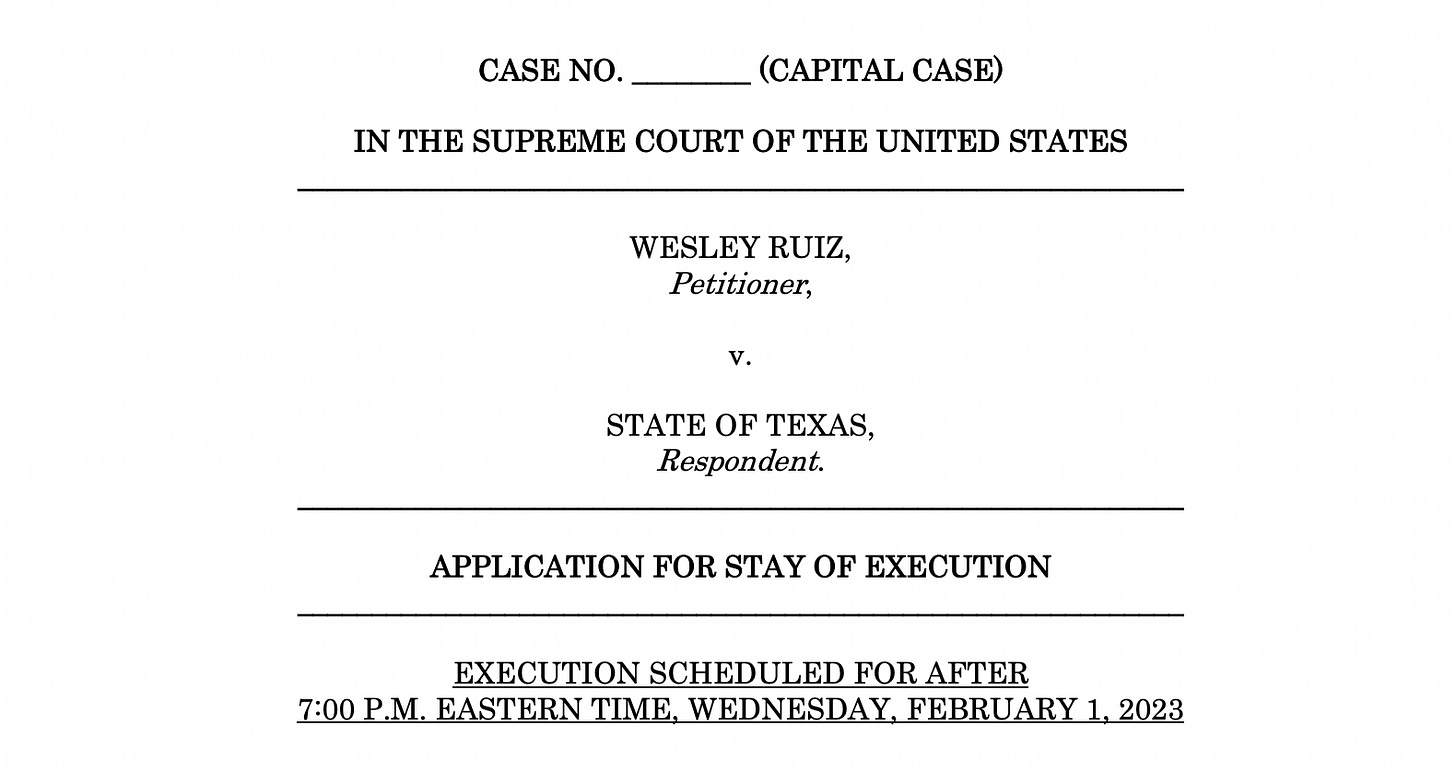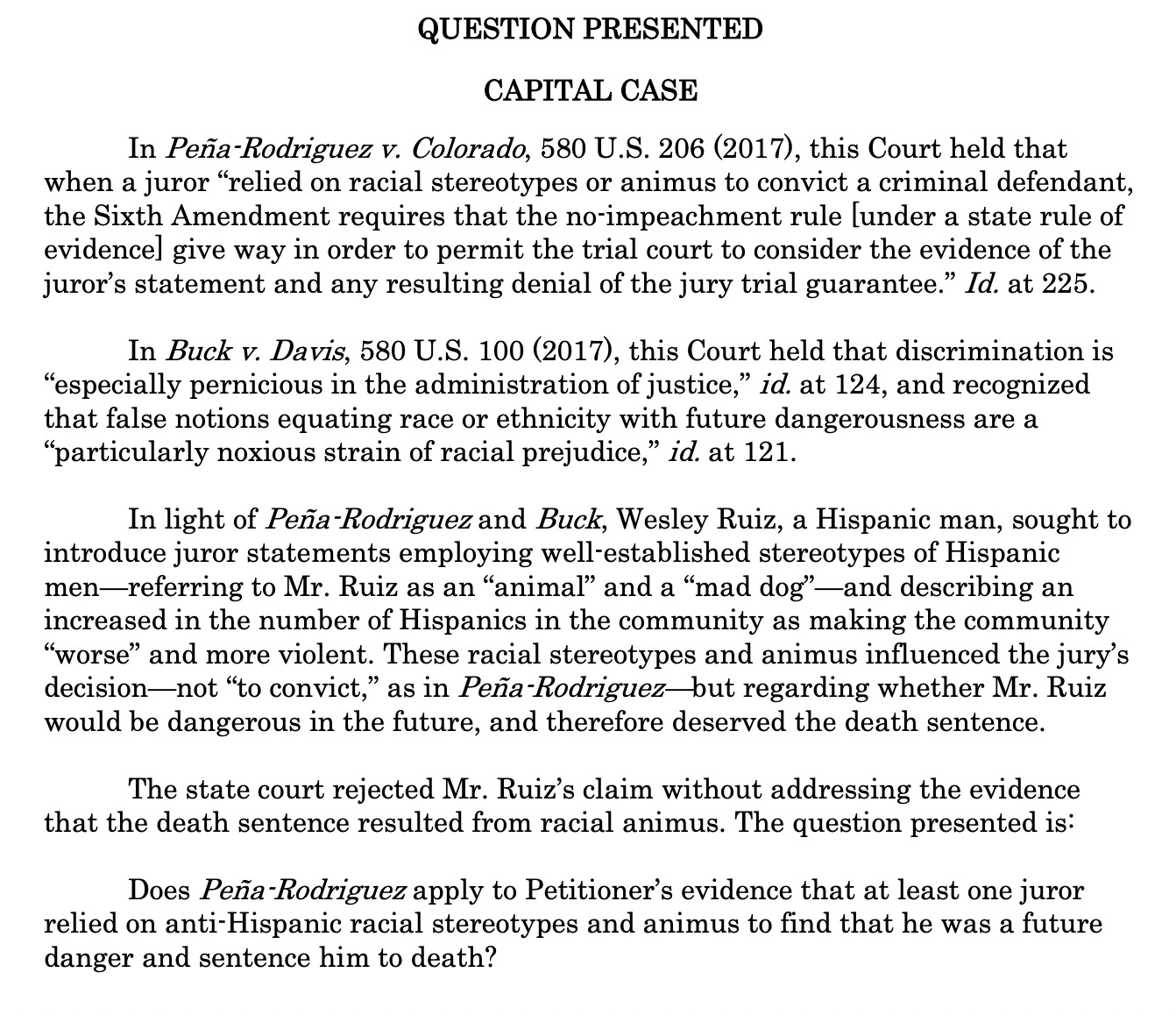Texas executed Wesley Ruiz. No court reviewed his allegation of racist jurors.
Texas argued "there is no worthy ground" for the Supreme Court to review the case. [Update: The Supreme Court denied Ruiz's request for a stay of execution; Texas then killed Ruiz.]
Texas is planning to execute Wesley Ruiz on Wednesday night.
Despite Ruiz’s claim that jurors’ racist views led to his being sentenced to death following his conviction for the 2007 murder of Mark Nix, a Dallas police officer, Texas courts refused — on procedural grounds — to even consider the question.
Now, Ruiz’s request for a stay of execution is before the U.S. Supreme Court, where he has very little chance of success because Texas claims that the Texas courts provided “an adequate and independent state law ground” — the procedural bar — for their decision.
[UPDATE, 5:30 p.m. ET: The U.S. Supreme Court denied Ruiz’s request for a stay of execution. There were no noted dissents.
UPDATE, 8:30 p.m. ET: Texas has executed Wesley Ruiz.]
This is the circle of much late death penalty litigation, as execution dates approach and long after initial efforts at relief have failed.
States like Texas have set up strict procedural bars on “subsequent” claims for relief in death penalty cases — usually under requirements that whatever evidence or arguments are being raised could not have been discovered or argued earlier. If the state courts decide they could have been brought previously, the merits of the arguments are not even considered.
Then, if that is appealed to the U.S. Supreme Court, the state argues that the federal court should not be allowed to consider the appeal at all because there is “an adequate and independent state law ground” for the decision, a standard set by the Supreme Court. If the court accepts that there was an “an adequate and independent state law ground” and does not find a federal ground for intervening, then it doesn’t look at the merits of the argument, either.
That brings us back to Ruiz’s claim. Although the request that matters for stopping Wednesday night’s scheduled execution is the application for a stay of execution, most such requests also have an underlying request for the court to hear a case — a petition for a writ of certiorari — challenging an aspect of the conviction or sentence or the state’s plan to carry out the execution. Here, Ruiz’s case is about the allegations regarding racist jurors and their effect on the sentencing phase of his trial:
In opposing Ruiz’s request, Texas argues, first, that Ruiz’s case “was dismissed on an adequate and independent state law ground, which divests this Court of jurisdiction.”
The state goes on to argue that even if the Supreme Court had jurisdiction, “Ruiz has not furnished a single reason to grant a writ of certiorari, let alone a compelling one.” Here’s where the state uses particularly circular reasoning.
“Ruiz attempts to undermine his conviction with ‘new’ evidence—namely, unreliable juror declarations that could have been obtained for inclusion in any of his three prior habeas applications,” the state argues.
In other words, the Texas courts decided not to consider the merits of this question about whether racist jurors are the reason why Wesley Ruiz is sentenced to death because they determined he could have discovered it and raised it earlier. Then, the state is arguing to the U.S. Supreme Court either that the “adequate and independent state law ground” rule applies and the federal court can’t review the state court decision or, even if the U.S. Supreme Court does have jurisdiction, that the justices shouldn’t take the case and review the merits of Ruiz’s case because, the state argues, Ruiz could have discovered this question about racist jurors earlier and raised it then.
“Because there is no worthy ground for which a writ of certiorari should be granted, Ruiz’s petition and concurrently filed application for stay of execution should be denied,” the state concluded in summarizing its argument — ignoring the question of whether racism led to a death sentence scheduled to be carried out Wednesday night.





I COULD HAVE found out yesterday that chicken for dinner tonight was still frozen. Does this mean that I can't have dinner tonight because I realized it today, but COULD HAVE realized it yesterday??? I sure hope not.
What a barbaric perspective - showing no respect for human life.
To repeat a point I have repeatedly made, these so-called "pro life" states sure are eager to put people to death, aren't they?